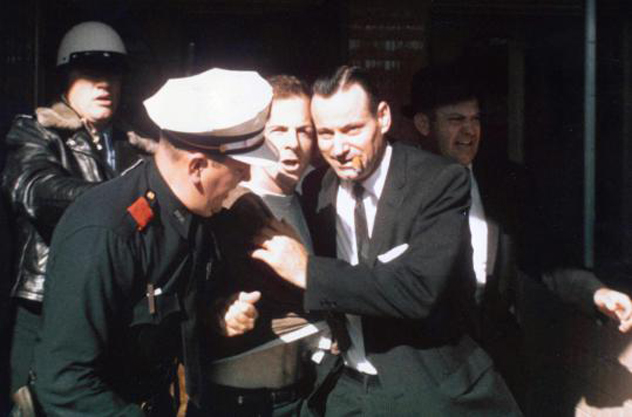10 Goliad Massacre
Texans have honored the brave martyrs of the Alamo for nearly 200 years. However, those who lost their lives in the Goliad Massacre just three weeks later have been largely forgotten. During the Texas Revolution, the Mexican Army overwhelmed a smaller force at the Battle of Coleto Creek on March 19, 1836. Although the Texans defended themselves admirably, Colonel James Fannin, their leader, decided to surrender against the insurmountable odds. The men were held as prisoners in Goliad’s Presidio La Bahia, a fort built more than a century earlier by the Spanish Army. A week later, the President of Mexico ordered the prisoners executed. A few, such as those who could serve as doctors, were spared. Forty men who were unable to walk were executed inside the fort. Another 302 men were marched outside and gunned down at point-blank range. Any survivors were then bludgeoned and slashed to death. Colonel Fannin was made to witness the slaughter of every last man—he was the last to be killed. He asked his captors to send his possessions to his family, to be given a Christian burial, and to be shot in the heart rather than the face. They shot him in the face, stole his belongings, and burned his corpse in a massive pile with the rest of the men. The men’s scorched remains were not buried, to the delight of the local vultures, but when news of Texas’s victory in the Revolution reached the soldiers at the Presidio a month later, they hurriedly buried the evidence of their crime.
9 Austin Plane Crash
Few government agencies are as openly reviled as the IRS, but most of us take out our frustrations with them by muttering a few expletives as we fill out our 1040s. However, Andrew Stack of Austin, Texas took his issues with the agency to a whole new level of crazy. On February 18, 2010, Stack set fire to his home, then he drove to Georgetown Municipal Airport, where he kept his plane, a single-engine Piper Dakota. At 9:56 on a sunny morning, he slammed the plane into Echelon I, an office building containing 190 IRS employees. There was a massive explosion that killed both Stack and Vernon Hunter, a 68-year-old Revenue Officer Group Manager. Thirteen others were injured, a number which likely would have been much higher if a team of firefighters hadn’t coincidentally been performing drills nearby. Stack’s accountant later confirmed that he was in the process of being audited. His suicide note read in part: “I saw it written once that the definition of insanity is repeating the same process over and over and expecting the outcome to suddenly be different. I am finally ready to stop this insanity. Well, Mr. Big Brother IRS man, let’s try something different; take my pound of flesh and sleep well.”
8 The Texas Eyeball Killer
Serial killers often acquire strange nicknames based on their crimes; consider Nannie Doss, a cheerful woman known for poisoning family members (including four husbands, her mom, her sister, her grandson, and her mother in law) with arsenic. She was known as “The Giggling Granny.” Then there was “The Big Eared Midget” of Buenos Aires, Argentina, and Russia’s “The Hippopotamus.” Of course, the Lone Star state has had plenty of butchers, but the “Texas Eyeball Killer” stands alone. The Eyeball Killer murdered three prostitutes in the Dallas area during a rampage that lasted from December 1990 until his apprehension in March 1991. Each woman had been shot dead and had had her eyeballs removed with surgical precision. Police patrols were increased in an attempt to catch this fiend, and finally a break came in the case. A fourth prostitute was attacked, but managed to escape by spraying the man with mace. Her description and some hairs found at the scene of the crime led to the capture of 57-year-old Charles Albright. Albright’s past was a stereotypical serial killer history. An orphan, he was prone to petty crimes, violence, and cruelty to animals. He’d spent some time in prison for theft, and had previously pled guilty to molesting a nine-year-old girl. The prosecution’s case against him was flimsy, but Albright was eventually found guilty of the murder of the third prostitute. He was sentenced to life imprisonment without the possibility of parole.
7 Murder Of Selena
Selena Quintanilla-Pérez was a Mexican-American songstress making her way up the Billboard charts in the 1990s. While riding a wave of seemingly unlimited potential, Selena was unceremoniously murdered in Corpus Christi, Texas, by Yolanda Saldívar, the former president of her fan club (who’d been embezzling funds). Selena had met with Saldivar at a motel to discuss the theft, when they got into an argument. During the argument, Yolanda produced a handgun from her purse, and when Selena fled, he shot the young singer in the shoulder. The bullet severed an artery, and she left a garish trail of blood behind her as she ran for help. She died of blood loss in the hospital shortly thereafter. Yolanda was arrested after an hours-long standoff with police and insisted that the shooting was an accident, but the prosecution argued that Saldivar, who was a trained nurse, neither called 911 or attempted to come to her aid. Prosecutors explained that the gun she’d used required 11 pounds of pressure on the trigger to fire, and it certainly didn’t help that a witness on the scene claimed Saldivar had followed the wounded Selena, screaming curses at her. She was ultimately convicted of murder and sentenced to life in prison. While the prisons of Texas are chock full of murderers otherwise ignored by the general population, Saldívar carries with her a significant stigma. Other inmates, sworn fans of the slain Tejano singer, levied numerous death threats against Saldivar. For this reason, she is kept in isolation for 23 hours a day, with one hour for recreation. She will be eligible for parole in 2025, when she will be in her mid-60s.
6 Jake Evans
Family photographs taken prior to October 2012 portray 17-year-old Jake Evans as the kind of handsome, all-American boy any girl would be proud to bring home to meet the folks. But something truly awful lurked just beneath this innocent veneer. One night that month, Evans rang 911 in a sort of daze, explaining to the dispatcher in a chilling monotone that he’d just murdered his 48-year-old mother and 15-year-old sister. He’d shot them both to death with a .22 revolver. When asked why he’d done it, he told the operator that “I am pretty, I guess, evil . . . whatever.” He then said “I don’t know . . . it’s weird. I wasn’t even really angry with them. It just kind of happened. I’ve been kind of planning on killing for a while now.” The police arrived shortly thereafter and Jake surrendered without incident. Luckily for the Evans family, there were only two people at home when Jake went on his rampage. Initially he’d considered causing much more carnage. In his written confession, he revealed, “My plan was to kill my sister and my mom at my house and then go over to my grandparents and kill my oldest sister, Emily, and my two grandparents. Then I was going to wait until morning and kill my other sister, Audrey, because she was visiting from college.” Had he been a year older, Jake Evans likely would have been sentenced to die by lethal injection, but as he was a minor when he committed his crime, he will instead spend the rest of his life in prison.
5 The Mysterious Death Of Greg Fleniken
Murder is usually as sadly mundane as any other pursuit; while the killer himself might remain mysterious, the methodology is grossly evident. But on September 14, 2010, the MCM Elegante Hotel in Beaumont, Texas, would play host to a bizarre death that stumped even seasoned pathologists. The morning after the incident, the co-workers of 55-year-old oilman Greg Fleniken reported to the hotel, explaining that their colleague was missing. When knocking on his door failed to rouse Fleniken, they entered, only to find his body lying on the carpet. He was a heavy smoker and his passing seemed like natural causes at first—until medical examiners opened his body. They found broken ribs, massive damage to the internal organs, and, curiously, a small laceration on his scrotum. He’d received the kind of blunt force trauma typically reserved for a high speed car crash. This was bizarre, given the fact that the body didn’t show any signs of bruising. Investigators followed several promising leads, but eventually came up dry. Desperate for answers, Fleniken’s widow hired a noted private investigator named Ken Brennan. Brennan doggedly pursued the case, and eventually came up with a novel idea: that Fleniken wasn’t in fact beaten, but shot. He returned to the hotel room where the body was found and discovered a hole where a bullet had traveled through the wall from the room next door. It roughly aligned with the indentation where the doorknob would hit the wall, and had been ignored. In the room opposite Fleniken’s, the hole had been patched with dried toothpaste. As Greg Fleniken had been cremated, his remains could not be exhumed, but upon studying autopsy photos with the medical examiner, it was determined that the trauma had been caused by the path of the bullet. The laceration to the scrotum was actually the entrance wound. Eventually, the story was confirmed: Three drunken electricians had been staying next to Fleniken. One of them was playing with a gun, which accidentally discharged. The group swore each other to secrecy, but when confronted with the truth, they folded. A man named Lance Mueller was eventually sentenced to 10 years for the crime, which he likely would have avoided had he come forward immediately.
4 J.D. Tippit
There are few events in American history as exhaustively studied as the assassination of John F. Kennedy. One of the pieces of trivia often glossed over about the saga was how Lee Harvey Oswald was apprehended in the first place. Within a few minutes of the shooting, Oswald’s description was circulated among the Dallas police. One of these officers was J.D. Tippit, a patrol cop who worked a beat in the residential neighborhood of Oak Cliff. Tippit spotted a man matching Oswald’s description on his rounds some 45 minutes or so after the incident. Witnesses reported the policeman exchanging words with the suspect from his patrol car, then exiting the car. Oswald pulled a handgun and shot 39-year-old Tippit three times in the chest. The officer toppled over, already likely mortally wounded, when the assassin walked over and shot him in the right temple. This crime was witnessed by several people, and has since been rolled into the labyrinthine conspiracy theory regarding JFK’s death. Certainly no publicly accepted reports implicate Tippit in any way. The grieving nation poured its support onto Tippit’s widow. One of the men who sent a donation was Abraham Zapruder, the man who filmed the most compelling footage of JFK’s death and went on to sell it to Life magazine for $150,000. He sent $25,000 of those proceeds to Tippit’s widow.
3 Luby’s Massacre
These days, mass shootings are tragically de rigeur, but this was not always the case. On October 16, 1991, a disturbed man named George Hennard drove his pickup truck through the front window of Luby’s Cafeteria in Killeen, Texas. At first, patrons believed that the crash was an unfortunate accident, and 48-year-old veterinarian Michael Griffith rushed to the driver’s aid. He was subsequently gunned down. Hennard then lurched toward Suzanna Hupp and her parents. Hupp was typically armed, but unfortunately, Texas law at the time prohibited concealed carry, and she had been forced to leave her weapon in the car. She watched helplessly as Hennard gunned down her parents. The misogynist gunman stalked through the restaurant targeting mostly female patrons and screaming “All women of Killeen and Belton are vipers!” Twenty-three people were killed and another 20 were injured. The rampage finally ended when police arrived and began exchanging fire with Hennard. Wounded, he slunk off to the bathroom and took his own life. The Luby’s massacre was the deadliest in American history for 16 years, until it was surpassed by the Virginia Tech massacre and the Sandy Hook elementary school shooting. Today, the building is occupied by a Chinese buffet.
2 Dr. John Hill
The tale of Dr. John Hill and his wife is as dark and convoluted as any soap opera. Hill was a plastic surgeon and wealthy in his own right, but he married into a family stacked with riches when he exchanged rings with Joan Robinson, the daughter of millionaire Texas oilman Ash Robinson. Theirs was a rocky union, with Hill seeing a mistress on the side. On March 18, 1969, Joan suddenly fell gravely ill. John drove her to get help with little apparent concern for her condition, passing several medical facilities in favor of a hospital in which he had financial interest. She was tended to by doctors, but died hours later of a mysterious ailment. Hill went on to be tried for murder by way of withholding medical attention. A mistrial was declared, but before he could be tried again, Hill was gunned down after answering his front door at his home in River Oaks, a suburb of Houston. Two women were traced to the crime—Marcia McKittrick, who was behind the wheel of the getaway car, and Lilla Paulus (who was connected to the victim’s father), who hired the gunman, a man named Bobby Vandiver. There was considerable suspicion that Robinson had orchestrated the hit to avenge the death of his daughter. However, no solid connection could ever be established, and Vandiver was killed shortly thereafter in a shootout with police. Ash Robinson died of natural causes in 1985 at 87 years of age.
1 Jerry Duane Martin, The Last Execution of 2013
Capital punishment was suspended in the United States in 1972, but in 1976, the US Supreme Court ruled to bring it back. Its occurrence is regulated on a state-by-state basis, with 18 states (plus Washington D.C.) banning the procedure. Unfortunately for the murderous, Texas does not count itself amongst these states. As of December 3, when a man named Jerry Duane Martin was given the lethal injection for murdering prison guard Susan Canfield during an escape attempt, 508 men in total have been executed since the reinstatement of capital punishment. Virginia, the next closest state, has only executed 110 people in the same time span. Bizarrely enough, the Texas Department of Corrections maintains a website that catalogs not only each condemned person’s name, but their crimes and last words. The majority of these have been proclamations of love, innocence, and forgiveness, but some are, understandably, just downright odd. Mike Devlin is an aspiring novelist.
























